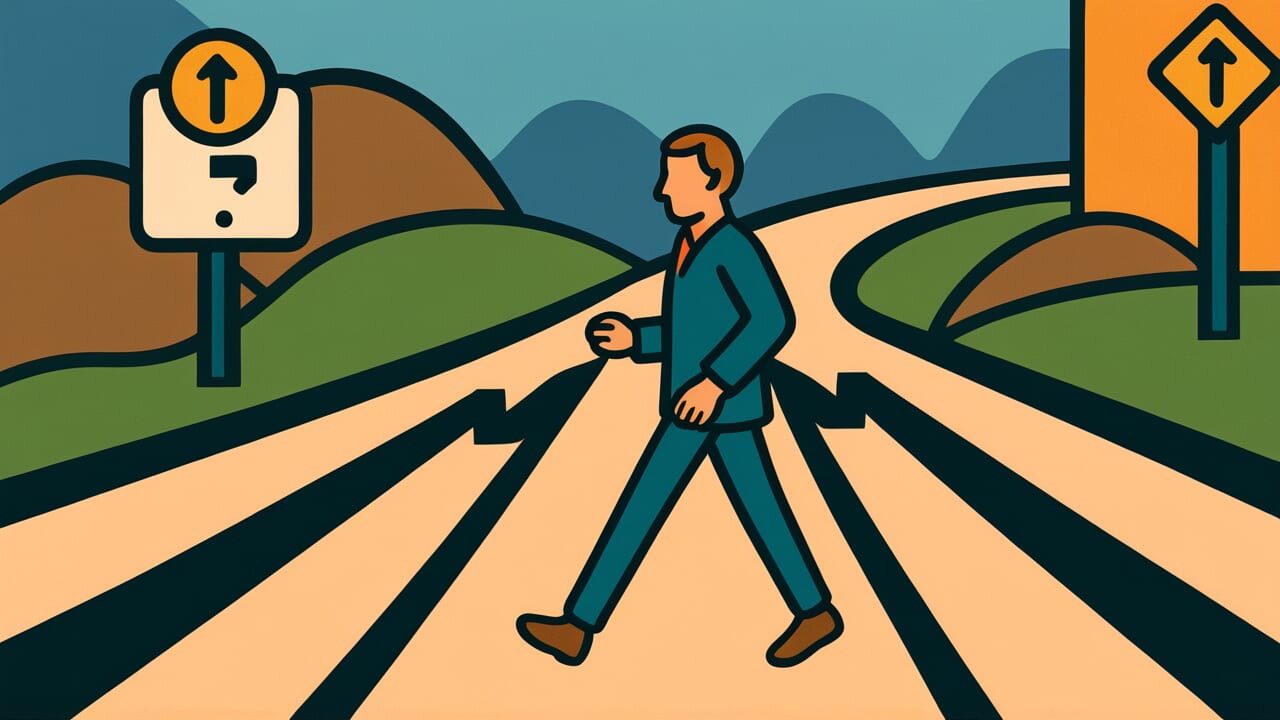How to Read “Those who walk many roads reach nowhere”
Kōdō wo yuku mono wa itarazu
Meaning of “Those who walk many roads reach nowhere”
This proverb teaches that people who cannot make decisions when faced with many choices will never reach any destination. If you keep hesitating at a crossroads where paths branch in all directions, you will never arrive at your goal.
This saying is used when teaching someone about the importance of making decisions. It applies to choosing a career path, deciding on work direction, or standing at life’s crossroads.
The proverb warns against dabbling in many things half-heartedly. It also cautions against exploring possibilities endlessly without taking a single step forward.
In today’s world, this teaching becomes even more meaningful. We live in an age of information overload. Having too many choices can actually make it harder to decide.
Many people want to keep all possibilities open. This desire prevents them from choosing anything at all. The proverb perfectly describes this modern dilemma.
It teaches us the courage to choose one path. It also reminds us of the determination needed to trust and follow the path we choose.
Origin and Etymology
The word “kōdō” in this proverb refers to a crossroads where paths branch in all directions. In ancient China, places where many roads met were called “kō.” These were lively spots where people came and went.
This proverb likely came from ancient Chinese philosophical thought. The importance of decision-making and focus has been discussed by thinkers throughout history.
The image of someone standing before branching paths became a symbol. It represented the indecisiveness that prevents people from reaching their goals.
The phrase structure is quite interesting. “Walking the crossroads” doesn’t just mean walking on a road. It suggests continuing to wander among the choices themselves.
In other words, it describes staying in a state of indecision. It’s not about choosing one path and moving forward. It’s about wandering endlessly among the options.
After reaching Japan, this teaching became important in bushido and merchant philosophy. The value of committing to one path and pushing forward has been repeatedly emphasized in Japanese culture.
The exact first written source is unclear. However, this universal teaching about the importance of decisiveness has been passed down through generations.
Usage Examples
- He tries to study for many different certifications, but those who walk many roads reach nowhere—everything ends up half-finished
- Just browsing job sites won’t help because those who walk many roads reach nowhere, so pick one and give it your full effort
Universal Wisdom
Humans have an instinctive desire to keep possibilities open. Choosing one path means giving up other paths. To escape the pain of that decision, we delay choosing.
We try to keep all options available and let time pass. But our ancestors understood a fundamental truth. Those who try to have everything end up with nothing.
This represents an eternal contradiction between human desire and reality’s constraints. The proverb has endured because it touches this essential human nature.
In every era and every place, people have feared making choices. They’ve been tempted by the sweet word “possibility.” They’ve avoided swallowing the bitter medicine of decision.
What’s interesting is what the proverb doesn’t say. It doesn’t warn against choosing the wrong path. The problem isn’t which road you choose—it’s not choosing at all.
There is no perfect choice. What matters is the courage to choose one imperfect path. What matters is the determination to keep walking that path.
Life is a series of choices. We can only move forward through those choices. This proverb confronts us with a simple but harsh truth about life.
When AI Hears This
Trying to travel multiple roads simultaneously makes all paths incomplete. You never reach your destination. From a communication network perspective, this reveals a surprising paradox.
When sending data over the internet, we don’t actually use only “the fastest route.” For example, Google’s data center communications deliberately distribute data across multiple paths.
This seems wasteful at first glance, but there’s a deep reason. If you rely only on the shortest route, everything stops the moment that path gets congested or fails. This is “the risk of concentrating on one optimal solution.”
Network theory calls this “the tradeoff between path diversity and efficiency.” Research shows that increasing reliability from 99% to 99.9% requires doubling or tripling the number of routes.
It looks like wasting resources, but it dramatically reduces losses from system failures. The essence of this proverb isn’t really about “focusing your choices.”
It’s warning about “vulnerability from resource dispersion.” Ancient people knew this from experience. Walking multiple paths half-heartedly is, in modern terms, “multitasking without redundancy.”
If you leave every route incomplete, you create a system that reaches nowhere. That’s the real warning here.
Lessons for Today
Modern society tends to think “having many choices equals richness.” But this proverb offers a different perspective. True richness isn’t in having many options—it’s in the power to choose one path.
If you’re struggling to make a decision right now, stop searching for the perfect choice. There’s no right answer on any path. But every path holds possibility.
What matters is the determination to make your chosen path the right one. This applies to career choices, learning directions, and relationships alike.
Don’t try to have everything. Choose one thing and go deep. Real growth comes from that focus and persistence.
Turn your time spent hesitating into time spent moving forward. The time you lose by not choosing never comes back.
Even if it’s imperfect, make the best choice you can today. Trust that path and start walking. That one step will surely lead you to your destination.



Comments